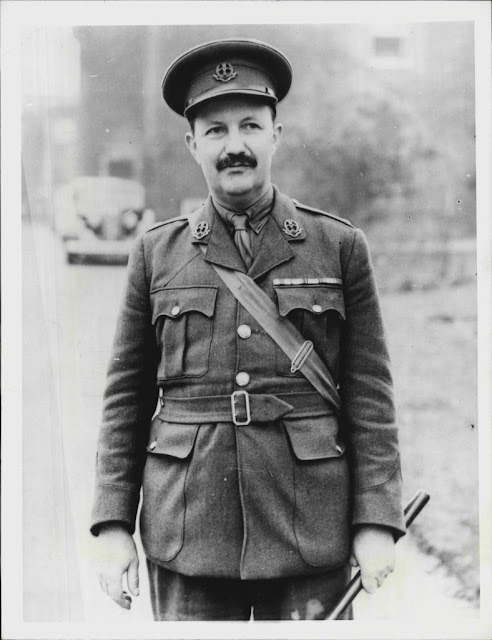Wednesday 28 February 1940
 |
| Member of the Swedish Volunteer Corps (Svenska Frivilligkåren). |
The Allies continue with their plan to send troops to Finland via the Narvik railway that passes through Norway and Sweden. Once again, they ask the Finns to request the right of passage from their Scandinavian brothers. There is no sign that such permission, which has been rejected repeatedly, is forthcoming.
Winter War Army Operations: The Finns are retreating in the Viipuri sector of the Karelian Isthmus, but in some places, they still retain the stronger hand. The Soviet plan drawn up by Semyon Timoshenko focuses the entire military might of the Soviet Union on the Karelian Isthmus, which is the pathway to the heart of Finland. While this strategy is succeeding, the Soviets have all but abandoned their troops in other sectors, which are on their own and, for the most part, not doing well.
Moscow issues an order at 00:45 permitting the surrounded 34th Moscow Tank Brigade to retreat from their position at Kitelae. By itself, this order does not do much good to trapped men. However, the Finns surrounding this group - what they call the East Lemetti Motti - allow the brigade and other remnants of the 18th Rifle Division of Soviet 8th Army to retreat through their lines on foot if they so choose. About 2500 Soviet men, including many sick and wounded, choose this option.
It is a long, painful walk in brutal conditions, and only about 1,000 Soviets make it to the Red Army lines to the South. Another 1500, who attempt to escape to the East, are killed or captured by other Finnish troops or succumb to the elements. Some Soviets remain defiant in the pocket, and the Finns attack them unceasingly. The Finns ultimately capture 105 tanks (many of which have been converted to fixed firing positions), 200 trucks and several field cars.
Farther north, near Salla, the Finns also are successfully keeping the Soviets at bay. The overall military picture, though, requires their efforts on the Karelian Isthmus. The Swedish Volunteer Corps (Svenska Frivilligkåren) takes over front line duty at Märkäjärvi, freeing Finnish troops for duty where they are needed in the south.
Winter War Peace Talks: The Finnish Council of State convenes to discuss the Soviet terms, which include major territorial concessions in the Karelian Isthmus, a base at Hango, and the return to Finland of the port of Petsamo.
Battle of the Atlantic: The Royal Navy launches the first in a new class of battleships, HMS King George V.
The Kriegsmarine lays a defensive minefield in the Ems estuary and an offensive field off the British coast.
Convoy OA 100G departs from Southend and OB 100 departs from Liverpool.
Military Intelligence: The U-33, which was scuttled while laying mines, lies in relatively shallow water (30 fathoms). British divers from HMS Tedworth enter it and recover various items from the conning tower. Previously, the British had recovered three Enigma rotors from one of the U-boat's men who had been instructed to throw them overboard but hadn't.
European Air Operations: The RAF performs extensive reconnaissance over the Berlin/Hannover sector in north Germany, including naval bases at Kiel and Cuxhaven. Paris claims to have shot down two Luftwaffe planes.
Palestine: Mandatory Palestine is divided into zones by Land Transfers Regulations. This effectively hampers any land registry by Jews.
Australia: The government forms the 7th Division for deployment overseas.
German Propaganda: Dr. Goebbels warns Sweden not to violate its neutrality. He also tells neutral countries to "curb their public opinion" which is strongly in favor of helping Finland.
German Homefront: While hardly on a total war footing, the Reich closes non-essential factories.
American Homefront: Mario Andretti is born in Montona, Italy (now Motovun, Croatia). He becomes a champion US race car driver in the 1960s.
 |
| Kermit Roosevelt in 1939 while serving in the British Army. |
February 1940
February 1, 1940: Second Battle of SummaFebruary 2, 1940: Soviet Assaults at Summa February 3, 1940: Soviets Capture a Bunker
February 4, 1940: Peace Talks in Stockholm
February 5, 1940: Allies to Invade Norway
February 6, 1940: Careless Talk Costs Lives
February 7, 1940: IRA Terrorists Executed
February 8, 1940: Spies!
February 9, 1940: The Welles Mission
February 10, 1940: Confiscation of Jewish Goods
February 11, 1940: Soviets Attack Mannerheim Line
February 12, 1940: Breaches In Mannerheim Line
February 13, 1940: Soviets Inching Forward in Finland
February 14, 1940: Soviets Batter Mannerheim Line
February 15, 1940: Finns Retreat
February 16, 1940: Altmark Incident
February 17, 1940: Manstein and Hitler Discuss Fall Gelb
February 18, 1940: Operation Nordmark
February 19, 1940: King Gustav Says No
February 20, 1940: Falkenhorst Commands Weserubung
February 21, 1940: Radar Advances
February 22, 1940: Friendly Fire
February 23, 1940: Soviets Present Their Demands
February 24, 1940: Fall Gelb Revised
February 25, 1940: Mr. Welles Comes to Visit
February 26, 1940: Battle of Honkaniemi
February 27, 1940: Finns Retreat Again
February 28, 1940: Overseas Volunteers Help Finland
February 29, 1940: Finns Accept Soviet Terms In Principle
2019


